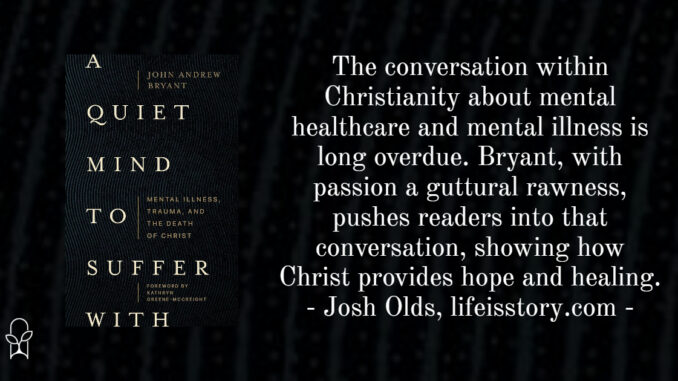
Published by Lexham Press on September 13, 2023
Genres: Non-Fiction, Memoir
Buy on Amazon
Goodreads

Suffering has been made holy by Christ’s proximity to it.
This is the story of Christ’s nearness to my own suffering―my mental breakdown, my journey to the psych ward, my long, slow, painful recovery―and how Christ will use even our agony and despair to turn us into servants and guests of the mercy offered in his gospel.
We cannot answer suffering. And yet suffering demands an answer. If Jesus is the answer to suffering, what kind of answer is Jesus? Everything that could be taken from a person was taken from him. The worst things a person could be made to see and feel were seen and felt by Christ. All of this came to a point in the nails driven into his hands and became a word that cannot be unspoken―his body broken and his blood poured out for us. Suffering has been made holy by Christ’s proximity to it.
A Quiet Mind to Suffer With is a haunting memoir/theological reflection the explores the intersection of mental illness, trauma, and faith. John Andrew Bryant is in recovery. Just a few years before writing this book, he was locked up—mentally and physically. Physically for his own safety; mentally as part of an overwhelming obsessive compulsive disorder. OCD can get thrown around in neurotypical parlance as a joke or as a synonym for having an attention to detail. Bryant shows that OCD is more than that, calling it the “place of my enslavement.” In poetic and stark terms, Bryant lays bare exactly how debilitating his mental illness was and how has come to manage it through Jesus.
This isn’t some happy sappy novel about how he prayed the OCD away. Rather, A Quiet Mind to Suffer With is what it says in the title: it shows how Bryant’s reliance on Jesus has made his mental illness manageable. Bryant frames his recovery from severe OCD as a spiritual journey out of bondage to his compulsions to the promised land of being present in his life. He seamlessly shifts between telling his personal narrative amid exploring a larger theodicy of suffering and the presence of Christ amidst pain and despair.
In the book, Bryant recounts how his journey toward ordination coincided with the beginnings of severe anxiety and intrusive thoughts, ultimately leading him into a psychiatric ward. He structures the book into sections that reflect on the different aspects of his experience, including his time in the psych ward, his recovery, and his ongoing journey with mental illness. It’s a candid and honest portrayal of the struggles that come with mental health issues and the complexities of finding faith amid such challenges. Bryant writes with a compelling honesty and vulnerability that is viscerally upsetting but also overlaid with hope.
In the 23rd Psalm, David writes not that God will take us over or around the valley of the shadow of death, but rather that God will be with us in the midst of that valley. A Quiet Mind to Suffer With is a story of finding joy, peace, and hope in that valley. There are any number of memoirs of those who have learned about the presence of Christ in their pain and suffering. Joni by Joni Eareckson Tada tells this story from the perspective of a woman who became paraplegic. A Grief Observed by CS Lewis tells this story from the perspective of someone who has lost a loved one. Everything Happens for a Reason: And Other Lies I’ve Loved by Kate Bowler tells this story from the perspective of a theologian facing a terminal cancer diagnosis. And the list continues. But what has been missing—up to this point—is an exploration of the topic from the perspective of an individual with mental illness. A Quiet Mind to Suffer With stands in the tradition of authors like Tada, Lewis, and Bowler, offering a deep and vulnerable personal and theological reflection on the presence of Christ in suffering.
Bryant, through his experiences, provides insights into how faith can offer a form of solace and companionship in the darkest of times. His narrative is a testament to the power of faith in providing hope and meaning amid suffering. The conversation within Christianity about mental healthcare and mental illness is long overdue. Bryant, with passion and a guttural rawness, pushes readers into that conversation—neither sugarcoating it nor catastrophizing it, but rather showing how Christ provides hope and healing.
